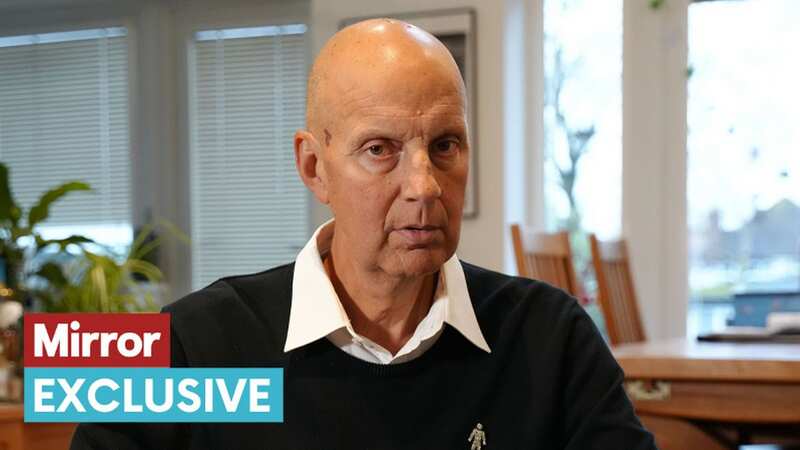Prostate cancer patients desperate for life-extending treatment denied access

A prostate cancer patient said it was “sad” a potentially life-extending treatment will not be made available on the NHS because it costs too much.
Thousands of men diagnosed with advanced prostate cancer in the UK will not receive the nuclear cancer drug - known as Lutetium-177 and sold under the brand name Pluvicto - as it was deemed too expensive by health bosses.
The innovative new medicine - an alternative to chemotherapy, but with fewer side effects - is for people with metastatic prostate cancer, which is when the disease has already spread to other parts of the body, such as the bones, and they are no longer responding to other treatments.
Clinical trials have found the drug increases the time before the cancer gets worse, as well as the lifespan of patients. But the therapy is currently only available in a small number of private hospitals in Britain. Duran Duran star Andy Taylor, who was diagnosed with stage-four prostate cancer in 2018, has been treated with Lutetium-177. The music legend, who was previously classified as needing “palliative end-of-life care”, said last year he “dodged a bullet” and is now asymptomatic.
The targeted treatment is given every six weeks for a total of six doses. Radioactive chemicals, which are given intravenously, seek out and destroy the cancer cells while reducing damage to the healthy tissue surrounding them.
 Teachers, civil servants and train drivers walk out in biggest strike in decade
Teachers, civil servants and train drivers walk out in biggest strike in decade
 Kevin Webber said: "Every treatment that can give a man an extra day, that is worth having" (Rosia Lonsdale)
Kevin Webber said: "Every treatment that can give a man an extra day, that is worth having" (Rosia Lonsdale)Advanced prostate cancer patient Kevin Webber, who was given just two years to live when he was diagnosed in 2014 at the age of 49, urged all those involved, including NHS bosses and the drug manufacturer, to continue negotiations over Lutetium-177.
“It’s a sad acceptance that these drugs cost so much and there is not enough money to pay for the cost,” said Mr Webber, who has raised more than £1million for charity Prostate Cancer UK, running ultramarathons around the world since being diagnosed.
“Every treatment that can give a man an extra day, that is worth having… I accept if it’s silly money you can’t have it. I accept it’s where we are - but it’s not what I want to accept.” Mr Webber, who lives in Surrey and is the author of Dead Man Running, added: “That is why it is essential to negotiate to get a fair deal for all stakeholders - the drug company, the NHS, the taxpayer, the patient, and their family.”
Why was Lutetium-177 not recommended?
The National Institute for Health and Care Excellence (NICE) - the government body that recommends which drugs and therapies should be made available on the NHS - said there was an “unmet need for new treatments” for men diagnosed with hormone-resistant metastatic prostate cancer in the UK.
Despite that, it didn't recommended the medicine for routine use on the NHS because of the cost. It was estimated that just over 3,800 people would have been eligible for treatment had it received approval.
According to NICE, the price of the drug is set by the pharmaceutical company that owns it - Switzerland-based medicines firm Novartis. The cost is currently £20,000 per 7,400 MBq single dose vial per treatment cycle (excluding VAT), a report by the government health body stated.
A NICE spokesperson said: “Our independent appraisal committee carefully considered all the evidence put forward for [Lutetium-177] for treating PSMA-positive hormone-relapsed metastatic prostate cancer after two or more therapies, but had to make the difficult decision not to recommend it as the price offered could not be considered a cost-effective use of NHS resources."
NICE said it met three times to consider the clinical and cost-effectiveness evidence provided by the company and other stakeholders - and provided "several extensions" for further evidence and analyses to be submitted. But the health body said there was a "lack of new data" comparing the drug with relevant medicines. It also said the company did not provide cost-effectiveness results for some of NICE’s preferred analyses.
"Unfortunately, as a result the treatment cannot be recommended for routine use in the NHS or the Cancer Drugs Fund," the spokesperson added. “Whether or not a medicine is recommended by NICE, is influenced by many factors, including the evidence on how well it works alongside suitable comparators but importantly also by its price, which is set by the company, not by NICE.”
 Greggs, Costa & Pret coffees have 'huge differences in caffeine', says report
Greggs, Costa & Pret coffees have 'huge differences in caffeine', says report
A Novartis spokesperson said it provided the “most viable” price to NICE, and that making medicine available to the NHS had become “increasingly challenging” in the UK.
They said: “Novartis was extremely disappointed by NICE's decision not to recommend Lutetium-177 for NHS patients. Despite extensive research, there remain few options for patients with advanced metastatic prostate cancer to give them more time with their families.
“Lutetium-177 is a radioligand therapy and the process of developing and delivering it is complex, including a just-in-time supply chain and a five-day shelf life. This treatment is now available to patients in some other developed countries, and in seeking to secure access for NHS patients Novartis provided the same data and most viable price to NICE. Novartis has a consistent track record of making medicines available to NHS patients, yet several factors have made this increasingly challenging over the last decade in the UK."
Novartis has warned that Britain is at risk of falling further behind comparative countries when it comes to patient access to innovative treatments if changes to the appraisal process for new and complex medicines are not made.
"We are committed to continuing to work with the government, NICE and the NHS to address these challenges and ensure patients are able to access the medicines they need," the company added.
Cancer charity Prostate Cancer UK is now urging all parties involved to work together to find a way to make the treatment available to men across the UK at a price the NHS can afford.
A spokesperson for the charity added: “Prostate Cancer UK is extremely disappointed by the decision by the NICE to reject Lutetium-177 for treating hormone-resistant advanced prostate cancer. This innovative type of radioligand therapy has already been shown to be effective in other types of cancer and clinical trials showed that it both extended lives by an average of four months and delayed progression of the disease, giving men with advanced cancer fewer symptoms and better quality of life for longer.
“Lutetium-177 is a great example of a targeted, precision treatment that could help many men with incurable, metastatic prostate cancer who currently have few options for treatment. NICE rejected the treatment as not being cost-effective, meaning hundreds of men stand to miss out on valuable additional time with their families.”
Read more similar news:
Comments:
comments powered by Disqus

































